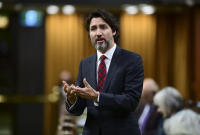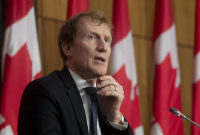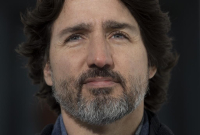Support strong Canadian climate journalism for 2025
Some provinces were forced to push back vaccination for health-care workers and vulnerable seniors on Monday as deliveries from a major manufacturer ground to a temporary halt.
Canada is not due to receive any Pfizer-BioNTech vaccines this week as the company revamps its operations, and deliveries are expected to be slow for the next few weeks.
Ontario announced Monday that it was pausing COVID-19 vaccinations of long-term care staff and essential caregivers so that it can focus on giving the shots to all nursing home residents.
Premier Doug Ford said the delay has taught the province that it can’t take vaccine shipments for granted.
"I want to be clear: we’re using every single vaccine we can to protect our most vulnerable," Ford told a news conference. "But delivery delays are forcing us to be careful and cautious as we plan, to ensure we’re able to offer second doses."
The news came as more cases of the more contagious U.K. variant of COVID-19 were detected across Ontario, including in at least one long-term care home.
Several provinces have used up nearly all their vaccine supply and have been forced to push back their vaccination schedules.
Saskatchewan announced Sunday that it had exhausted all the doses it has received so far, while Quebec has used up more than 90 per cent of its supply.
Quebec confirmed that the delay would force it to postpone its vaccination rollout in private seniors' residences, which had been scheduled to start Monday.
"Let's be realistic: our vaccination momentum will be reduced as of this week," Marjaurie Cote-Boileau, press secretary to Health Minister Christian Dube, said in a text message.
"Given the important reduction of Pfizer doses we'll receive in the next two weeks, we have had to review our vaccination calendar."
Quebec finished giving first doses to long-term care residents last week and has vaccinated some 9,000 seniors in private homes by using leftover doses. The province gave less than 2,000 shots Sunday, compared to an average of more than 9,600 a day over the previous week.
The Manitoba government also said it may soon have to put off some second-dose vaccine appointments as a result of the disruptions to the supply of the Pfizer vaccine.
Prime Minister Justin Trudeau has said the delay is only temporary and that Canada is expected to receive 4 million doses of the Pfizer vaccine by the end of March.
Deputy Prime Minister Chrystia Freeland said Monday there is “tremendous pressure” on the global supply chain for vaccines that the government has tried to mitigate.
“We are working on this every single day, because we know how important vaccines are to Canadians, to first and foremost the lives of Canadians and also to our economy," she told a news conference in Ottawa by video.
She repeated the government’s promise that by the end of September, all Canadians wishing to be vaccinated will have received their shots.
Despite the vaccine delay, some provinces continued to report encouraging drops in the number of new cases and hospitalizations. Ontario reported fewer than 2,000 cases, as well as fewer people in hospital. It was a similar story in Quebec, where hospitalizations dropped for a sixth straight day.
Newfoundland and Labrador also reported no new cases of COVID-19 for a third straight day.
This report by The Canadian Press was first published Jan. 25, 2021.





Comments
Ontario has over 125,000 doses in storage after administering only 286,000. Manitoba has administered only 53.5% of the vaccine it has received.